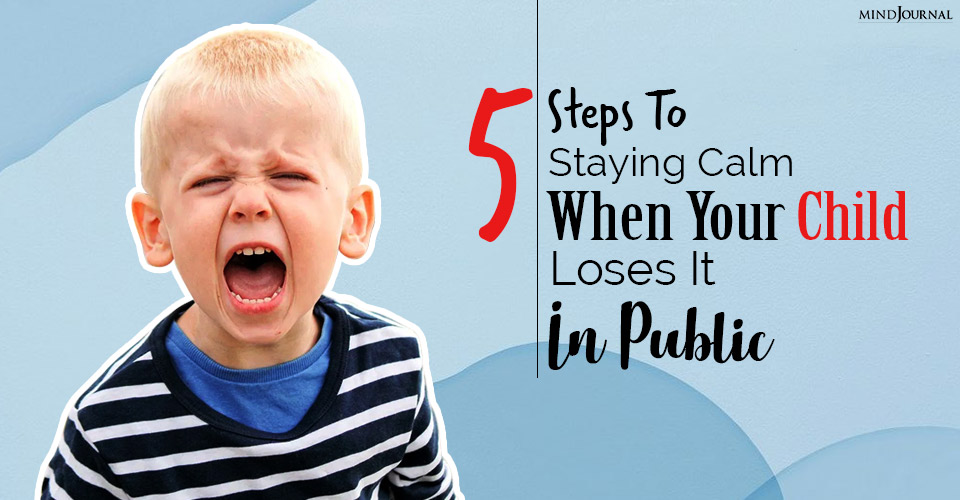Childhood breakdowns are a normal part of growing up. How to handle your child instead of feeling embarrassed? Here’s a five-step guide for you.
Key Points:
- Childhood breakdowns are a normal part of growing up; parents should not feel embarrassed.
- Remain calm and stay focused on your child, ignoring any onlookers.
- Validate your child’s feelings and offer choices whenever possible.
Jacob, almost 3 years old, has thrown himself on the floor of the grocery store screaming that he must have one more chocolate, just one more!
Sound familiar? If so, you are not alone. Most parents of young children live in terror of their little one losing it in public. It’s hard to avoid feeling judged and ashamed of out-of-control behavior as if it is evidence of your total incompetence as a parent—surely a result of your indulgence which has inevitably created a spoiled child. This naturally puts most parents in an emotionally charged place, feeling embarrassed and often angry at their child for putting them in this deeply uncomfortable and stressful situation.

Here are five steps to responding in these mortifying moments that can help you stay calm and carry on in a way that is loving to you and your child:
1. Don’t Let The Onlookers Get To You.
Ideally, just tune them out. Most are likely feeling your pain, having been there themselves, and aren’t judging. And, for those voyeurs feeling some guilty pleasure that it’s not them in the hot seat, or who think they know better, ignoring is still a good strategy so you can stay focused on coming up with a productive response to helping your child cope.
Read Raising Well-Behaved Kids: Mistaken vs. Smart Discipline
2. Kill Them With Kindness.
If a bystander makes some really helpful comment (sarcastic font), avoid being reactive. You have nothing to be defensive about. Instead, try: “It is so nice that you want to help. I really appreciate it. But I’m all good. Learning that he can’t get everything he wants is a hard lesson for a little guy, right?”
This is a nice way to send some important messages: “I am in control, and I am being a really good parent by setting appropriate limits and helping my child learn to cope with life’s disappointments.” This can be a particularly good strategy when it is your mother, or mother-in-law, or another close friend or family member who is trying to help.
Read The Impact Of ADHD On A Child’s Schooling
3. Stay Calm.
If you are anxious and upset, your child is more likely to be anxious and upset. If you are calm and composed, she is likely to pull herself together more quickly. So while your emotional reaction is completely understandable, it is not strategic to respond in a revved-up, harsh way. Remind yourself that your child isn’t losing it on purpose.

When she is falling apart, she needs you to be her rock. It’s best to take a few deep breaths and remind yourself that if you decompensate, too, it will likely make the situation more stressful and challenging. (And, for those of you who can’t let go of what others are thinking—you don’t want to give any judgy onlookers ammunition.)
Read 13 Positive Phrases To Calm Your Child
4. Validate Your Child’s Feelings.
“I know you don’t like that I am not giving you any more chocolate. I totally understand your disappointment.” Validating feelings is not the same as validating behavior. Feelings aren’t the problem; it’s what kids do with their feelings that can be problematic. (Also true for parents.)
That’s why one of your most important jobs is to help your child learn to manage these strong, difficult emotions in acceptable ways. But that takes time and practice. And, it starts with validation—the first step in helping children identify and then manage their feelings.
5. Provide Choices, When Possible, That You Can Implement.
For example, in the case above, it might mean offering your child a choice of another acceptable food that he can have. Even when offering the alternative, your child may flat-out reject it and intensify the tantrum to show you just how lame he thinks this other option is. In that case, calmly say, “You are so upset about not getting what you want that you’re losing control. It is my job to keep you safe; so, your choices are to walk holding my hand or I can be a helper and put you in the cart to help you get back in control.”
Read 12 Ways to Empower Your Child Against Bullying
If he can’t pull himself together, place him in the cart (or stroller, or car seat—depending on the situation you’re in) with as much calm as you can muster. Ignore all his efforts to get you to react. A helpful tactic can be to start talking about anything else but the incident at hand, as that is only likely to inflame your child further.
For example, if you are in the grocery store, you might talk about what you see in the different aisles and ask if he wants to point to familiar items—playing “I Spy.” This lets your child know you are going to ignore his outburst, but you are not ignoring him; and, that you can handle his upset and will be a “safe base” for him.
Most importantly, try not to allow your worry about bystanders’ opinions and judgments to drive your behavior in these situations. Many parents report that they end up giving in to their child to avoid the embarrassment and to take everyone out of their misery, even though they don’t think that’s best for their child. But you have nothing to be embarrassed about; and when you give in, your child is cleverly putting two and two together: “Mommy or Daddy will pretty much give me anything to get me to quiet down when we’re outside the house!”
Children having breakdowns when they don’t get their way is a normal part of growing up. When you respond calmly and with empathy, and set clear limits that you can enforce, you send both your child and the onlookers the message that you’re all good—calm and in control.
Written by: Claire Lerner Pre-order her book coming out 9/2021: Why is My Child in Charge? Originally appeared on: Psychology Today Republished with permission.










Leave a Reply